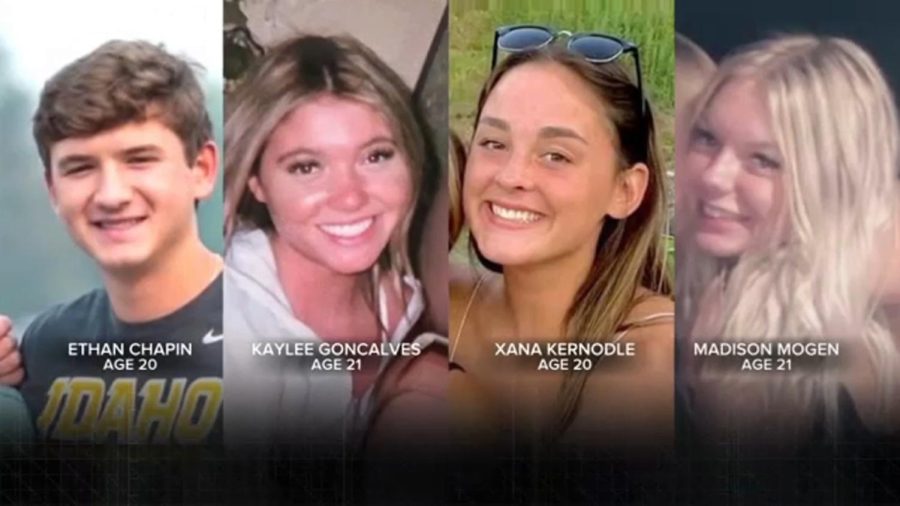Stop Glorifying Murder
On November 13, the small town of Moscow, Idaho was shaken to its core by the killing of four University of Idaho students on the second and third floors of their off-campus apartment. The case quickly gained traction online, especially among members of Gen Z, whose similarity in age to the victims spurred a morbid curiosity. Theories about the murderer spiraled, with many taking to the internet to accuse a myriad of innocents of being responsible, as well as scolding investigators for their perceived lack of progress.
Yet, on the morning of December 30, only seven weeks after the crime was committed, police took a suspect, 28 year-old Bryan Kohberger, into custody. Authorities located the Criminal Justice PhD student by his vehicle, a white Hyundai Elantra seen near the off-campus apartment in the early hours of November 13. They have also matched his DNA to genetic material found at the scene. Currently, motive remains unclear, and investigators are still unsure of the relationship between Kohberger and the victims.
Still, the internet is on the case, and has raised a frenzy surrounding a now-deleted Reddit post reportedly made by Kohberger, seeking participants for a research project to “understand how emotions and psychological traits influence decision-making when committing a crime.” Further, TikTok users have identified a profile on the app by the name of @josco1972 that posted several videos about the murders, divulging hyper-specific details that had not been made available to the public. In one now-deleted clip, friends of Kohberger confirm the voice and silhouette to be his.
Though I understand why people resonate with this case so deeply, as well as the appeal behind true crime and playing detective, the internet has taken it too far this time. In trying to solve this case, these “TikTok detectives” pinned blame upon current and previous partners of the deceased, an employee at the food truck two victims stopped by that night, and most commonly, the other two roommates who inhabited the apartment.
Dylan Mortenson and Bethany Funke, the first-floor roommates and TikTok’s most wanted, are not only mourning the murders of some of their closest friends, but also processing the traumatizing experience of these killings happening only a few feet away from them. For strangers to take to the internet and pronounce them responsible for these atrocities, spinning theories from thin air like they are dealing with a television series rather than peoples’ real lives, is abominable.
The recent trend of social media frenzies emerging around real world tragedies, as seen here, as well as in the case of Gabby Petito, has no doubt been fueled by the rising popularity of T.V. shows and movies romanticizing murderers. For example, in the recently released television series about Jeffrey Dahmer, the infamous serial killer was played by superstar Evan Peters, and in the Ted Bundy movie, the film’s namesake was portrayed by heartthrob Zac Efron. This disturbing new wave of media coupled with series like Criminal Minds, Law and Order, and NCIS has blurred the line between fact and fiction, and led people to act in a completely inappropriate manner, as the University of Idaho killings sadly demonstrate.
However disheartening this behavior may be, it is certainly no novelty in this hyper-digital age. A similar phenomenon can be observed in the highly publicized defamation trial between Johnny Depp and Amber Heard in April of 2022, where internet users obscenely glorified the distressing abuse Mr. Depp suffered. The fact of the matter is simple both in the case of Mr. Depp and in that of the slain university students: these are real people. They are not characters out of an exhilarating murder mystery. They are people’s children, siblings, and friends, and to treat their deaths with anything but the utmost respect and delicacy is vile.
Such insensitivity cannot become our new normal. The internet as a whole must remember that when tragedy strikes, we are dealing with the loss of real people’s lives. As an online observer, the most comforting thing one can do to ease the pain of a victim’s friends and family is not to play detective, to aimlessly point blame in an attempt to emulate Spencer Reid, but to simply give condolences for the loss and keep a respectful distance from the situation.

Arielle is an IB Senior who is very excited for her fourth and final year with The Banner. Outside of The Banner, you can find her telling unfunny jokes...


